25个英语中考常考句型转换知识点
中考英语词性转换与句型转换复习(含解析)
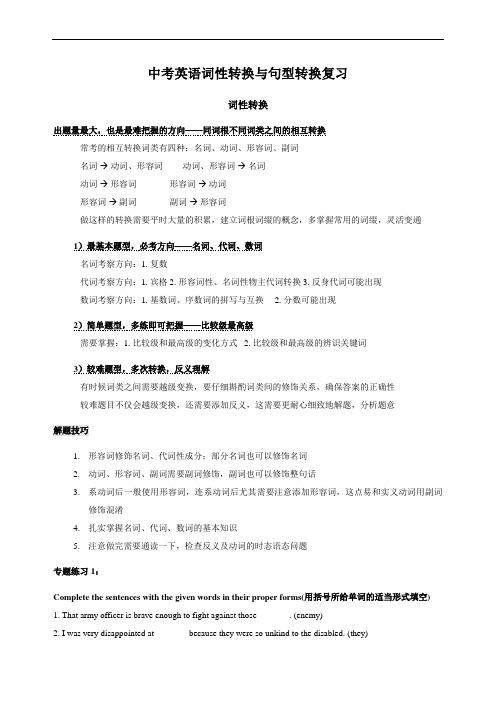
中考英语词性转换与句型转换复习词性转换出题量最大,也是最难把握的方向——同词根不同词类之间的相互转换常考的相互转换词类有四种:名词、动词、形容词、副词名词→动词、形容词动词、形容词→名词动词→形容词形容词→动词形容词→副词副词→形容词做这样的转换需要平时大量的积累,建立词根词缀的概念,多掌握常用的词缀,灵活变通1)最基本题型,必考方向——名词、代词、数词名词考察方向:1. 复数代词考察方向:1. 宾格 2. 形容词性、名词性物主代词转换 3. 反身代词可能出现数词考察方向:1. 基数词、序数词的拼写与互换 2. 分数可能出现2)简单题型,多练即可把握——比较级最高级需要掌握:1. 比较级和最高级的变化方式 2. 比较级和最高级的辨识关键词3)较难题型,多次转换,反义理解有时候词类之间需要越级变换,要仔细斟酌词类间的修饰关系,确保答案的正确性较难题目不仅会越级变换,还需要添加反义,这需要更耐心细致地解题,分析题意解题技巧1.形容词修饰名词、代词性成分;部分名词也可以修饰名词2.动词、形容词、副词需要副词修饰,副词也可以修饰整句话3.系动词后一般使用形容词,连系动词后尤其需要注意添加形容词,这点易和实义动词用副词修饰混淆4.扎实掌握名词、代词、数词的基本知识5.注意做完需要通读一下,检查反义及动词的时态语态问题专题练习1:Complete the sentences with the given words in their proper forms(用括号所给单词的适当形式填空)1. That army officer is brave enough to fight against those _______. (enemy)2. I was very disappointed at _______ because they were so unkind to the disabled. (they)3. Langping helped the Chinese Women’s Volleyball Team win the gold medal in her _______. (fifty)4. The smart kid is learning to _______ two foreign languages at the same time. (speech)5. Shanghai Disneyland is an _______ park which is popular among visitors. (amusing)6. People show their respect to the _______ policeman for his great deeds. (wound)7. It was surprising that my father dealt with this problem in such a/an _______ way. (usual)8. Traditional Chinese medical treatment is _______ practiced in western countries now. (wide)专题练习2:1.基数词与序数词的互相转换1. Let' s take the lift up to the restaurant on the floor. (twenty)2. Linton is interested in Chinese history and this is his _____ visit to Beijing. (four)3. Our new flat is on the ______ , and we have a good view of the park. (ten)4. Mum made a big chocolate cake for little Kevin’s _____birthday. (six)5. We still need ______more chairs for the meeting room. (ninth)6. Eric, the ______son of the family, has a special interest in physics. (three)7. Alex is _____years old and is taken good care of in the kindergarten. (fourth)8. Climb up to the ___ floor, and you can enjoy a better view. ( eleven)2. 名词变复数1. I received some Christmas _______ from my pen pals. (card)2. The street near my house is always crowded with cars and ______.(bus)3. They bought some _______ at the supermarket yesterday. (potato)4. Many historical ________will be shown on National Day. (movie)5. Joanna received many ______ when graduating from middle school. (gift)6. It is said that eight _____ of water a day can help you keep fit. (glass)3. 人称代词的形式变化1. Billy looks upset. What happened to _____? (he)2. “Would you tell ______ about your trip to Russia?” the children asked Uncle Joe. (we)3. Mandy has got a lovely dog. ______name is Oliver. (It)4. I think the girl is old enough to tie up her shoes by ______. (her)5. Whose school uniform is that on the chair, yours or______? (my)6. Don't worry about your son. He is old enough lo be independent and live by_____. (he)4. 形容词和副词的转换(1)副词转换为形容词1. The exams usually take place at the end of June. (finally)2. On a night, you can see thousands of stars in the sky.(clearly)( 2 )形容词转换为副词1. The children were _____excited when they saw the two pandas, tuantuan and yuanyuan. (real)2. It rained ______ last night and the river rose two feet. (heavy)3 . I can_____ work out the problem. And you? (easy)4. The old lady could hardly believe that she had got the travel pass to Hong Kong so _____. (easy)5. Mary is good at writing. She will _____ be a reporter in the future. (possible)6. Listen! The birds are singing _______ in the woods. (beautiful)7.____, Grace made up her mind to live abroad with her daughter. (final)8. You need to explain your opinions quite ______when having a debate. (clear)9. The young mother is singing ______to her baby son now. (soft)10. With the help of Yellow Pages, we found the address of the theatre _____. (easy)5. 形容词转换为反义词1. It is for an ordinary plane to fly to the moon. (possible)2. Someone thinks the number 13 is an_______number, (lucky)3. It is ______ to improve our English without enough practice.(possible)4. It's ______for him to be so active today as he is always a man of few words. (usual)5.If you don't go on a diet, it is_____for you to lose weight. (possible)6. 名词和形容词之间的转换1. Some famous are going to give lectures in our university in August. (science)2. Lucy looks in Mum's shoes. (fun)3.—What's your________? (national)—Chinese.4.1 don't like the flat here. It's too________.(noise)5. Who's your_______ teacher? (physical)—Mr.Lu.6. Feng Ai’s love and ________ will always be remembered by her students and their parents in Yunnan. (kind)7. The fishermen are told to be more careful on ______ days. (wind)8. More people are getting to know the ________ of environmental protection. (important)9. To be lovely Shanghainese , we should be helpful and ______________ to others. (friend)10. The situation in that country is ______________ . You’d better not go there. (danger)11. It is _______________ of Peter to pay so much money for clothes. (fool)12. Fishing is one of my ________ outdoor activities. (favour)13. The Iraq War has made thousands of children ______________. (home)14. I believe knowledge is more ______________________ than money. (power)15. Shirley has done a lot for the tourists. She is really a ____________ guide. (help)16. It’s difficult for us to tell the ____________ between these two words. (different)17. It was _________ for human beings to predict weather in the past. (difficulty)62. The short play was very ____________ . I laughed from beginning to end. (fun)7. 名词和动词之间的转换1. At the of this century, the APEC conferences were held successfully in Shanghai(begin)2.Telephone_______ are developing very quickly throughout our country.(serve)47. Mr Chen was surprised to see the fast ________ in Shanghai after his long absence from the 3ty. (develop)4 A bus ______ is responsible for the safety of his passengers. (drive)5. I ______ we see a film about the Anti-Japanese War. (suggestion)6. The young man works as a _______ in a five-star hotel. (wait)7. Grandpa is going to ________ his house and live with us. (sale)8. Nowadays too many boys want to become ________. (act)9. The students had a _______ in the English class yesterday. (discuss)10. Put some milk into the flour, break two eggs and then ______ them. (mixture)11. More and more foreigners are learning to _______ Chinese nowadays. (speech)12. Who is the ______ of the book War and Peace? (write)13. It's raining heavily. I'd _____ you call a taxi home now. (suggestion)14. There is a beautiful ______on the wall in each room of my house. (paint)15.local people had to move away because of the serious ______. (pollute)16. Ba Jin is one of the famous_______ in China,8.动词与形容词、副词之间的转换1. Wang Wei, the young pilot, _____for our country. He will live in our hearts forever. (dead)2. In weather, the old had better stay at home.(freeze)3. Many people caught cold last month because of the ________ weather. (change)4. Watch , and you will find the difference between the two pictures. (care)5. ________ food is convenient to cook so it’s a craze in supermarkets. (freeze)6. A group of young Japanese had an _______ tour in our town last month. (enjoy)7. The local people are ________ that the whole nation are helping them rebuild the town. (thank)8. It is a very ____book for language learners lo improve writing skills. (use)9.The movie kungfuPandaII is sure to_____ a large number of teenagers. ( attractive)10. Don’t throw the old watch away. It is still ________. (use)句型转换句型转换考点解析:1. 肯定句变否定句和否定句:常考的考点:have 、do句型2. 反义疑问句:常考的考点:带有否定副词的句子。
初中英语知识点归纳常见的句子结构与变换

初中英语知识点归纳常见的句子结构与变换英语作为一门语言,在初中阶段的学习中扮演着重要的角色。
了解常见的句子结构和变换是学习英语语法的基础。
下面,本文将对初中英语中常见的句子结构和变换进行归纳总结。
一、陈述句结构与变换1. 常见陈述句结构:主语+谓语+宾语例句:She eats an apple.(她吃了一个苹果。
)2. 句子变换:变成一般疑问句,将谓语动词提到主语前面,主语和谓语之间要加助动词do或does(第三人称单数形式)。
例句:Does she eat an apple?(她吃苹果吗?)3. 句子变换:变成否定句,将谓语动词前加助动词do或does的否定式。
例句:She does not eat an apple.(她不吃苹果。
)二、疑问句结构与变换1. 常见疑问句结构:疑问词+谓语+主语+宾语例句:What does she eat?(她吃什么?)2. 句子变换:变成陈述句,去掉疑问词后,注意主语和谓语的位置调换。
例句:She eats an apple.(她吃了一个苹果。
)1. 常见祈使句结构:谓语+宾语例句:Eat your dinner.(吃你的晚饭。
)2. 句子变换:变成陈述句,加入主语you或其他适当的主语。
例句:You eat your dinner.(你吃你的晚饭。
)四、感叹句结构与变换1. 常见感叹句结构:What/How+形容词/副词/名词+谓语!例句:What a beautiful flower it is!(多么漂亮的花啊!)2. 句子变换:变成陈述句,去掉感叹词和感叹号。
例句:It is a beautiful flower.(这是一朵漂亮的花。
)五、条件句结构与变换1. 常见条件句结构:If引导的条件从句+主句例句:If it rains tomorrow, we will stay at home.(如果明天下雨,我们将呆在家里。
)2. 句子变换:将条件从句移到主句之前,主句部分用will/would/can/could/might等情态动词代替。
初中英语知识点归纳常用句型及句式转换

初中英语知识点归纳常用句型及句式转换英语学习中,句型和句式是非常重要的基础知识。
掌握常用的句型和灵活运用句式可以帮助我们更好地理解英语语法和提高语言表达能力。
下面是初中英语中常见的句型和句式转换的归纳总结。
一、肯定句和否定句的转换1. 肯定句:主语 + 动词 + 其他成分否定句:主语 + 助动词 do/does/did + not + 动词 + 其他成分例句:He is a doctor.(肯定句)He is not a doctor.(否定句)2. 肯定句:主语 + am/is/are + 名词/形容词 + 其他成分/地点/时间否定句:主语 + am/is/are + not + 名词/形容词 + 其他成分/地点/时间例句:They are students.(肯定句)They are not students.(否定句)3. 肯定句:主语 + 动词 + 副词/介词短语 + 其他成分否定句:主语 + 助动词 do/does/did + not + 动词 + 副词/介词短语 + 其他成分例句:She speaks English fluently.(肯定句)She does not speak English fluently.(否定句)二、一般疑问句和特殊疑问句的转换1. 一般疑问句:肯定句:Do/Does/Did + 主语 + 动词 + 其他成分?否定句:Do/Does/Did + 主语 + 动词 + not + 其他成分?特殊疑问句:疑问词 + 一般疑问句的语序例句:She goes to school by bus.(一般疑问句)Does she go to school by bus?(特殊疑问句)2. 一般疑问句:肯定句:Am/Is/Are + 主语 + 名词/形容词 + 其他成分/地点/时间?否定句:Am/Is/Are + 主语 + not + 名词/形容词 + 其他成分/地点/时间?特殊疑问句:疑问词 + 一般疑问句的语序例句:They are students.(一般疑问句)Are they students?(特殊疑问句)3. 一般疑问句:肯定句:助动词 + 主语 + 动词 + 副词/介词短语 + 其他成分?否定句:助动词 + Do/Does/Did + 主语 + 动词 + not + 副词/介词短语 + 其他成分?特殊疑问句:疑问词 + 一般疑问句的语序例句:He speaks English fluently.(一般疑问句)Does he speak English fluently?(特殊疑问句)三、陈述句和祈使句的转换1. 陈述句:主语 + 动词 + 其他成分祈使句:动词 + 其他成分(一般省略主语 you)例句:They play football.(陈述句)Play football.(祈使句)2. 陈述句:主语 + am/is/are + 名词/形容词 + 其他成分/地点/时间祈使句:Be + 名词/形容词 + 其他成分/地点/时间例句:You are a student.(陈述句)Be a student.(祈使句)3. 陈述句:主语 + 动词 + 副词/介词短语 + 其他成分祈使句:动词 + 副词/介词短语 + 其他成分例句:She speaks English fluently.(陈述句)Speak English fluently.(祈使句)通过以上的归纳总结,我们可以更好地理解和运用常用的句型和句式转换。
中考常考的词汇拼写和句型转换技巧归纳
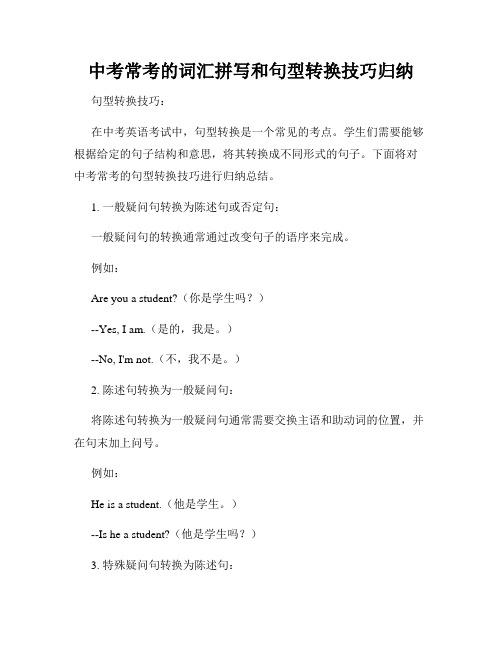
中考常考的词汇拼写和句型转换技巧归纳句型转换技巧:在中考英语考试中,句型转换是一个常见的考点。
学生们需要能够根据给定的句子结构和意思,将其转换成不同形式的句子。
下面将对中考常考的句型转换技巧进行归纳总结。
1. 一般疑问句转换为陈述句或否定句:一般疑问句的转换通常通过改变句子的语序来完成。
例如:Are you a student?(你是学生吗?)--Yes, I am.(是的,我是。
)--No, I'm not.(不,我不是。
)2. 陈述句转换为一般疑问句:将陈述句转换为一般疑问句通常需要交换主语和助动词的位置,并在句末加上问号。
例如:He is a student.(他是学生。
)--Is he a student?(他是学生吗?)3. 特殊疑问句转换为陈述句:特殊疑问句转换为陈述句需要将原句的疑问词替换为陈述句中对应的词语。
例如:What is your name?(你叫什么名字?)--My name is Mike.(我的名字叫迈克。
)4. 否定句转换为肯定句或一般疑问句:否定句转换为肯定句通常需要去掉否定词,并改变动词形式为肯定形式。
例如:I don't like bananas.(我不喜欢香蕉。
)--I like bananas.(我喜欢香蕉。
)否定句转换为一般疑问句则要交换助动词和主语的位置,并在句末加上问号。
例如:I don't like basketball.(我不喜欢篮球。
)--Don't you like basketball?(你不喜欢篮球吗?)5. 直接引语转换为间接引语:直接引语转换为间接引语通常需要改变动词的时态和人称,并在引语前后加上引号。
例如:"I like swimming," he said.(他说:“我喜欢游泳。
”)--He said that he liked swimming.(他说他喜欢游泳。
)词汇拼写技巧:除了句型转换,词汇拼写是中考英语考试中另一个常见的考点。
九年级中考复习之句型转换
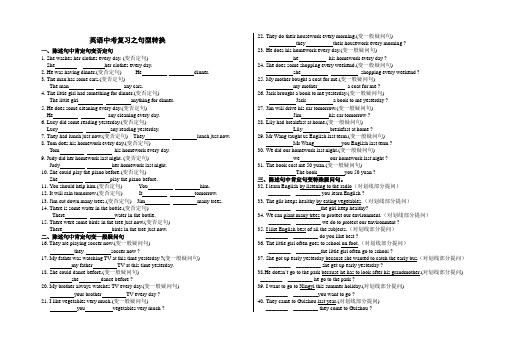
英语中考复习之句型转换一、陈述句中肯定句变否定句1. She washes her clothes every day. (变否定句)She her clothes every day.2.He was having dinner.(变否定句) He dinner.3.The man has some cars.(变否定句)The man any cars.4.The little girl had something for dinner.(变否定句)The little girl anything for dinner.5.He does some cleaning every day.(变否定句)He any cleaning every day.6.Lucy did some reading yesterday.(变否定句)Lucy any reading yesterday.7.They had lunch just now.(变否定句) They lunch just now.8.Tom does his homework every day.(变否定句)Tom his homework every day.9.Judy did her homework last night. (变否定句)Judy her homework last night.10.She could play the piano before.(变否定句)She play the piano before.11.You should help him.(变否定句) You him.12.It will rain tomorrow.(变否定句) It tomorrow.13.Jim cut down many trees.(变否定句) Jim many trees.14.There is some water in the bottle.(变否定句)There water in the bottle.15.There were some birds in the tree just now.(变否定句)There birds in the tree just now.二、陈述句中肯定句变一般疑问句16. They are playing soccer now.(变一般疑问句)they soccer now ?17. My father was watching TV at this time yesterday ?(变一般疑问句)my father TV at this time yesterday.18.She could dance before.(变一般疑问句)she dance before ?20.My brother always watches TV every day.(变一般疑问句)your brother TV every day ?21.I like vegetables very much.(变一般疑问句)you vegetables very much ? 22.They do their housework every morning.(变一般疑问句)they their housework every morning ?23.He does his homework every day.(变一般疑问句)he his homework every day ?24.She does some shopping every weekend.(变一般疑问句)she shopping every weekend ?25.My mother bought a coat for me.(变一般疑问句)my mother a coat for me ?26.Jack brought a book to me yesterday.(变一般疑问句)Jack a book to me yesterday ?27.Jim will drive his car tomorrow.(变一般疑问句)Jim his car tomorrow ?28.Lily had breakfast at home.(变一般疑问句)Lily breakfast at home ?29.Mr Wang taught us English last term.(变一般疑问句)Mr Wang you English last term ?30.We did our homework last night.(变一般疑问句)we our homework last night ?31.The book cost me 50 yuan.(变一般疑问句)The book you 50 yuan ?三、陈述句中肯定句变特殊疑问句。
中考英语句型转换的方法
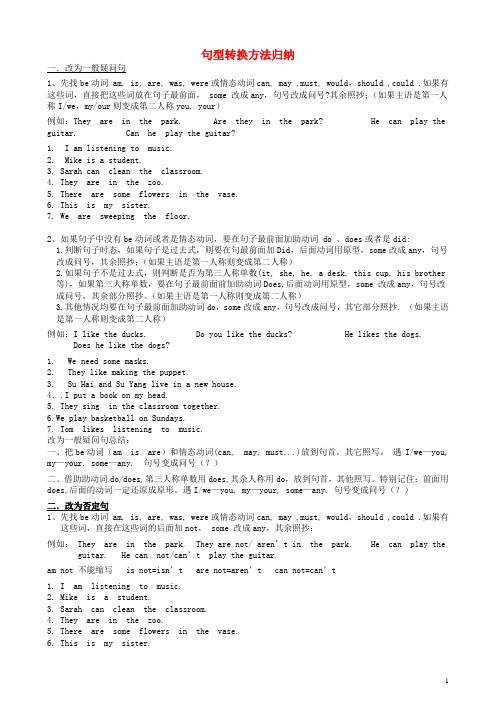
句型转换方法归纳一.改为一般疑问句1、先找be动词 am, is, are, was, were或情态动词can, may ,must, would,should ,could .如果有这些词,直接把这些词放在句子最前面, some 改成any,句号改成问号?其余照抄;(如果主语是第一人称I/we,my/our则变成第二人称you, your)例如:They are in the park. Are they in the park? He can play the guitar. Can he play the guitar?1. I am listening to music.2. Mike is a student.3. Sarah can clean the classroom.4. They are in the zoo.5. There are some flowers in the vase.6. This is my sister.7. We are sweeping the floor.2、如果句子中没有be动词或者是情态动词,要在句子最前面加助动词 do 、does或者是did:1.判断句子时态,如果句子是过去式,则要在句最前面加Did,后面动词用原型,some改成any,句号改成问号,其余照抄;(如果主语是第一人称则变成第二人称)2.如果句子不是过去式,则判断是否为第三人称单数(it, she, he, a desk, this cup, his brother等),如果第三人称单数,要在句子最前面前加助动词Does,后面动词用原型,some 改成any,句号改成问号,其余部分照抄。
(如果主语是第一人称则变成第二人称)3.其他情况均要在句子最前面加助动词do,some改成any,句号改成问号,其它部分照抄. (如果主语是第一人称则变成第二人称)例如:I like the ducks. Do you like the ducks? He likes the dogs.Does he like the dogs?1.We need some masks.2.They like making the puppet.3.Su Hai and Su Yang live in a new house.4..I put a book on my head.5. They sing in the classroom together.6.We play basketball on Sundays.7. Tom likes listening to music.改为一般疑问句总结:一、把be动词(am is are)和情态动词(can, may, must...)放到句首,其它照写。
初中易考知识点基本句型的变换

初中易考知识点基本句型的变换句子是语言交流的基本单位,句型的变换在英语学习中起着重要的作用。
通过灵活运用不同的句型变换,可以丰富句子表达,增加句子的多样性和变化性。
本文将探讨初中易考的基本句型及其变换方式,帮助同学们掌握句型的变化技巧。
一、陈述句的变换1. 陈述句变一般疑问句陈述句变一般疑问句时,只需将主语与谓语动词的位置进行互换,同时在句尾加上问号。
示例:陈述句:She is a doctor.一般疑问句:Is she a doctor?2. 陈述句变否定句陈述句变否定句时,在谓语动词前面加上否定词"Not"。
示例:陈述句:He likes playing basketball.否定句:He does not like playing basketball.3. 陈述句变祈使句陈述句变祈使句时,除去主语,将谓语动词直接使用原形,表示一种命令、请求或建议。
示例:陈述句:You should study hard.祈使句:Study hard.二、疑问句的变换1. 一般疑问句变陈述句一般疑问句变陈述句时,将疑问句中的助动词或情态动词去掉。
示例:一般疑问句:Do you like ice cream?陈述句:You like ice cream.2. 特殊疑问句变陈述句特殊疑问句变陈述句时,将特殊疑问句中的疑问词与句子其他部分保持原来顺序即可。
示例:特殊疑问句:Where is the library?陈述句:The library is at the corner of the street.三、否定句的变换1. 否定句变陈述句否定句变陈述句时,去掉否定词"Not"。
示例:否定句:He does not like playing soccer.陈述句:He likes playing soccer.2. 否定句变一般疑问句否定句变一般疑问句时,只需将否定词"Not"与陈述句的其他部分交换位置即可。
必备英语中考句型转换词组及时态
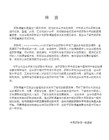
十.现在完成进行时:
1.概念:在过去某一时刻之前开始的动作或状态一直持续到说话为止
2.基本结构:have/has +been+doing
几种常见时态的相互转换
英语中的几种时态在一定情况下可以互相转换,以下是几种常见的转换形式:
十一、 一般过去时与现在完成时的转换
在现在完成时中,延续性动词能与表示一段时间的状语连用,瞬间动词却不能。但是,可用别的表达方式:①瞬间动词用于“一段时间 + ago”的一般过去时的句型中;②瞬间动词可改成与之相对应的延续性动词及短语,与一段时间连用;③瞬间动词用于“It is + 一段时间 + since + 一般过去时”的句型中,表示“自从……以来有……时间”的意思,主句一般用it is来代替It has been;④瞬间动词用于“Some time has passed since + 一般过去时”的句型中。请看:
3.基本结构:was/were+doing
4.否定形式:was/were + not + doing.
5.一般疑问句:把was或were放于句首。
6.例句:At that time she was working in a PLA unit.
When he came in, I was reading a newspape so busy.
三、 现在进行时:
1.概念:表示现阶段或说话时正在进行的动作及行为。
2.时间状语:now, at this time, these days, etc.
3.基本结构:am/is/are+doing
4.否定形式:am/is/are+not+doing.
- 1、下载文档前请自行甄别文档内容的完整性,平台不提供额外的编辑、内容补充、找答案等附加服务。
- 2、"仅部分预览"的文档,不可在线预览部分如存在完整性等问题,可反馈申请退款(可完整预览的文档不适用该条件!)。
- 3、如文档侵犯您的权益,请联系客服反馈,我们会尽快为您处理(人工客服工作时间:9:00-18:30)。
25个英语中考常考句型转换知识点
1. while +延续性动词
2. why don't you do = why not do
3. will you please do?will you please not do?
4. with one's best = with the help of sb 在某人的帮助下
5. with the help of sb 在某人的帮助下 with one's help
6. work at…在某处工作
7. work with sb 和某人一起工作
8. would like sth /to do sth
9. would you please +do
10. yet :至今,用在否定句中
11. you'd better do 最好做某事 = you'd better not do 最好不要做某事
12. 系动词(taste吃起来/sound听起来/look看起来/semll闻起来)+adj
13. 名词、副词、形容词修饰 enongh 时, 形容词放在之前,名词副词放在之后
14. 太多 too much +不可数 too many +可数 much too 相当于very ,修饰形容词
15. 向宾语提问:Whom
16. 向地点提问:Where
17. 向方式提问:How
18. 向价格和不可数名词提问:How much
19. 向可数名词提问:How many
20. 向频率提问: How often
21. 向时间段提问:How long
22. 向时间提问:what time/when
23. 向物主代词提问:Whose
24. 向职业提问:what do/does……do
25. 向主语提问: Who。
